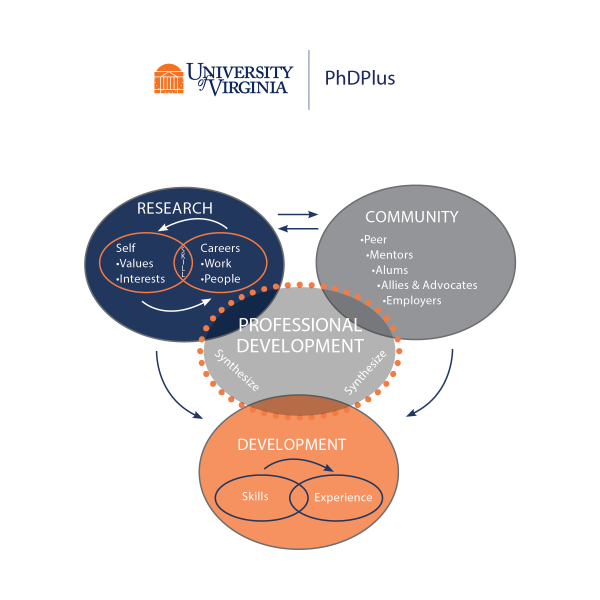Mechanics
The PhD Plus program mechanics follow the strategic framework outlined in this schematic, program philosophy and definition of core modules. To best understand how to apply the strategic framework in career development, please participate in the PhD+ Career Design skills series offered every Fall & Spring semester.
All career training core modules offer categories that are to be addressed in sequence and that involve various levels of effort and duration of engagement. Trainees should spend longer in Research and Community categories, to learn about the breadth of careers and desirable skills, and only invest in Skills and Experience categories of one or two core modules for career development after they have done thorough analysis and reflection provided by the research and community levels.
Case Study
To best understand this process, let’s look at a hypothetical case study of a PhD student (Pat H.) utilizing this framework for career and professional development. Pat is a third-year PhD student who is unsure of their career interest. Pat attends the PhD Plus Career Design skills series and comes to identify an initial interest in consulting and policy careers. Pat will now use the recommended strategic framework to set professional development goals and will take advantage of the PhD Plus annual calendar of offerings to set plans in motion over the course of their PhD training.
Level 1. Research: Pat applies research skills to analyze self and careers:
- Self: their values, interests, and treasured skills
- Careers (e.g., in consulting): types of consulting work PhDs typically pursue, types of sectors where this work is done, structure and culture of consulting organizations. Pat attends PhD Plus events labeled as part of the “Consulting” core module and with the category “research” to gather data.
While gathering data, Pat repeatedly reflects on and refines their interest in the specific field of consulting work in alignment with their values and interests.
Level 2. Community: To effectively research the gamut of consulting work across sectors, Pat also learns from peers with shared interests, and connects with PhD alums in the field. This, in turn, facilitates the cultivation of their professional community of peers, alums, mentors and potential employers.
In the third year of PhD, Pat explores the research and community categories of PhD Plus Consulting and spends 6 months to a year learning and assessing their interests. Finally, Pat decides that they find strategy consulting especially interesting. In parallel, Pat had also been researching and building a community for policy careers; however, they quickly realized this career option wasn't as attractive as imagined. Therefore, Pat decided to move forward with setting precise professional development goals for a strategy consulting career.
Level 3. Skills series: Through the research and community categories of consulting, Pat also learned about a suite of skills and experiences that are valued by employers in strategy consulting, particularly strategy work. Pat followed PhD+ guidelines recommending that trainees participate in relevant skills series during the middle years, typically 2-3 years before dissertation completion and job search. Pat participated in a PhD+ Consulting “skills series” in their 4th year, which is typically scheduled over four weeks in the fall and four weeks in the spring semesters.
Level 4. Experience: Through this process, Pat met with career advisors and mentors for consulting. They advised Pat to invest in one brief but valuable experience to demonstrate their interest in consulting to employers, ideally a year before graduation. Pat browsed through different project-based learning and internship opportunities afforded under the PhD+ consulting “experience” category and participated in an internship in the summer semester of their 4th year.
Thus, having acquired evidence-based knowledge of self and of career interests, Pat strategically participated in the most relevant PhD+ offerings to research possible careers and to develop a professional community, skills, and experience. In the Fall semester of their 5th year, Pat started the job search process while completing the dissertation, succeeding in attaining an offer, by the end of their 5th year, for a fulfilling Consulting position.

